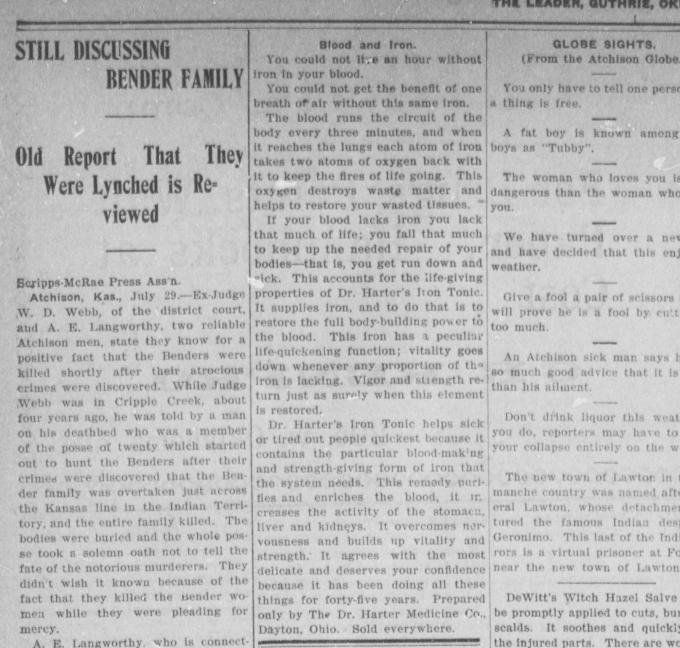|
Moderated by NW Okie! |
Volume 15 , Issue 352013Weekly eZine: (374 subscribers)Subscribe | Unsubscribe Using Desktop... |
The Bender Family

It is in The Leader, Guthrie, Oklahoma, dated Monday, 29 July 1901, page 3, that we found this headline concerning the Bender family (a.k.a The Bloody Benders) of Cherryvale, Kansas, who went on a murderous binge from 1871 through 1873. the headlines read: "Still Discussing Bender Family, Old Report That They Were Lynched Is Reviewed."
Atchison, Kans., 29 July 1901 -- Ex-Judge W. D. Webb, of the district court, and A. E. Langworthy, two reliable Atchison men, state they know for a positive fact that the Benders were killed shortly after their atrocious crimes were discovered. While Judge Webb was in Cripple Creek, about four years ago (1897), he was told by a man on his deathbed who was a member of the posse of twenty which started out to hunt the Benders after their crimes were discovered that the Bender family was overtaken just across the Kansas line in the Indian Territory, and the entire family killed.The bodies were buried and the whole posse took a solemn oath not to tell the fate of the notorious murderers. They didn't wish it known because of the fact that they killed the Bender women while they were pleading for mercy.
A. E. Langworthy, who was connected wight he state university, said his uncle F. E. Langworthy, also a member of the posse, who lived at Greeley county, Kansas, told him the same story about the fate of the Benders. Langworthy says his uncle told him the story as a secret. Only two, it was said, of the posse were then living.
Chicago, July 29 (1901) -- Were the members of the notorious Bender family alive? According to the story told by William G. Adkins, an expert accountant with offices in the Fisher building they were not. Mr. Adkins was for years in the vicinity of the home of the notorious quartette of Kansas murderers. He went to Parsons, Kansas, in 1876, nearly three years after the strange disappearance of the noted band.
Kansas at that time was discussing the strange manner in which the members of the family were lost to the world. Parties were made up each week from points near the Benders' home which visited the scene of the wholesale murders, and it was on one of these visits that Mr. Adkins became convinced that the family had not escaped from the country. He made inquiries of many familiar with the history of the family and its sudden disappearance and he followed clue after clue.
Each bit of testimony that came to Mr. Adkins' ears was closely sifted, and he gained many points on the case that had not reached the public's ears. Mr. Adkins continued investigating for four years after the family had disappeared, but he failed to learn anything that tended to throw new light on the noted case until he made the acquaintance of an old town character who lived under the name of "Governor Mortimer."
Mortimer at first refused to give any information regarding the Benders, but later on he hinted that the family would never be found. Then he declared that they were not alive and that they had not come to a natural end. Finally Mortimer told the story.
Shortly after the disappearance of Dr. York, a brother of a member of the Kansas legislature, he said, he, with other citizens of the section, put a watch on the Benders. A small company composed of friends of Mortimer was placed under the leadership of William Dick.
Nothing was seen that would have caused the authorities to arrest the Benders until Dr. Yorke's brother, alarmed at his long disappearance, followed the course of the doctor's journey with the result that his dead body was found near the Benders' farm. Shortly after this discovery the Benders disappeared. According to the place they left the county, but Mortimer insisted they were followed by the band under Dick, which became a vigilance committee.
The Bender family made desperate attempts to elude their pursuers, he said, but they were caught on the banks of the Verdigris river. The weather had been extremely hot and there had been a drouth. The river, hardly larger than a creek was almost dry. The committee, after the capture of the Benders, held a Judge Lynch trial on the river bank. The prisoners were declared guilty and all four members of the family were hung. The vigilantes buried the bodies in the bottom of the river at the dead of the night, and they were swallowed up by the sands coming down the river with the first rain.
For fear of arrest the band kept the secret of the disappearance among themselves until after the death of Dick. When the leader died Mortimer told the story.
"If Governor Stanley, of Kansas, has issued requisitions for the arrest of four persons at Fort Collins, Colorado, who answer the descriptions of the Bender family he will find that he has gone to a great deal of trouble for nothing." said Mr. Adkins. "Had I the time and if I knew the exact location in the river in which the family are said to have been buried, I would almost stake my life that I could find enough of the bodies to prove that Mortimer's story is true."
| View or Add Comments (0 Comments)
| Receive
updates ( subscribers) |
Unsubscribe
| © . Linda Mcgill Wagner - began © 1999 Contact Me | |
